Eat your greens: JWCC chef is converting students to cleaner culinary habits
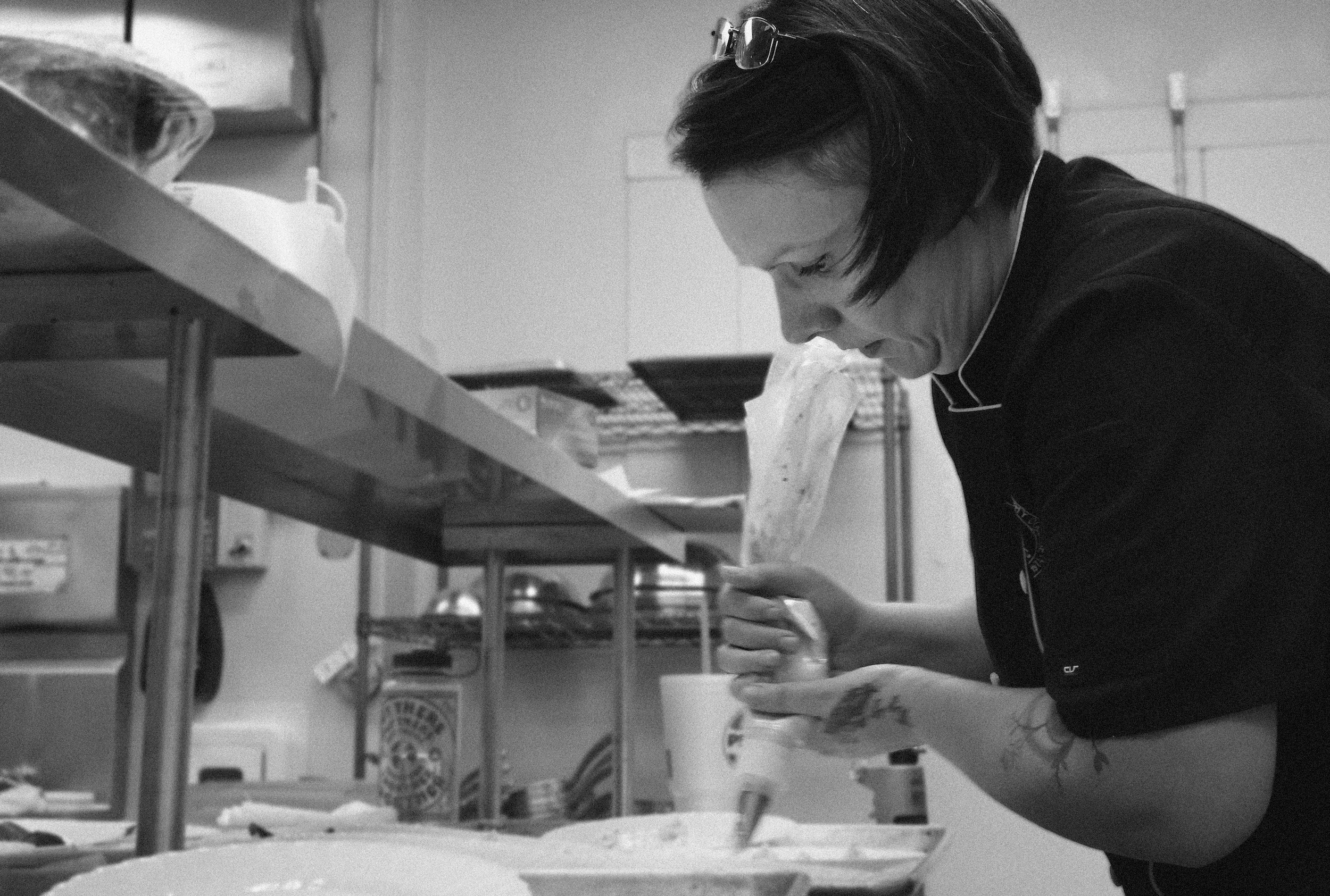
QUINCY — A “girl dinner” is a romantically pathetic spread of whatever can be gathered quickly, effortlessly and economically. My version typically consists of a cheese stick, a few handfuls of trail mix, a clementine, a couple slices of turkey, 17 mini rice cakes and a granola bar. Bon appétit.
So when Chef Vanessa Hall, head of the recently resurrected culinary arts and food service programs at John Wood Community College (JWCC) and founder of Simply UnJunked, handed over a piece of dressed arugula in the JWCC cafeteria a week and a half ago, it was the first time in weeks that a single leafy green had entered my system.
Hall and her team had been preparing a four-course meal for the guests of the third installment of their dinner-and-a-movie series — a showing of “Burnt,” which followed beef bourguignon and “Julie and Julia” in February and the Disney movie “Ratatouille” served with its namesake dish in November. Hall sent me with a to-go box upon my departure, which was dutifully placed in the fridge until work was finished that evening.
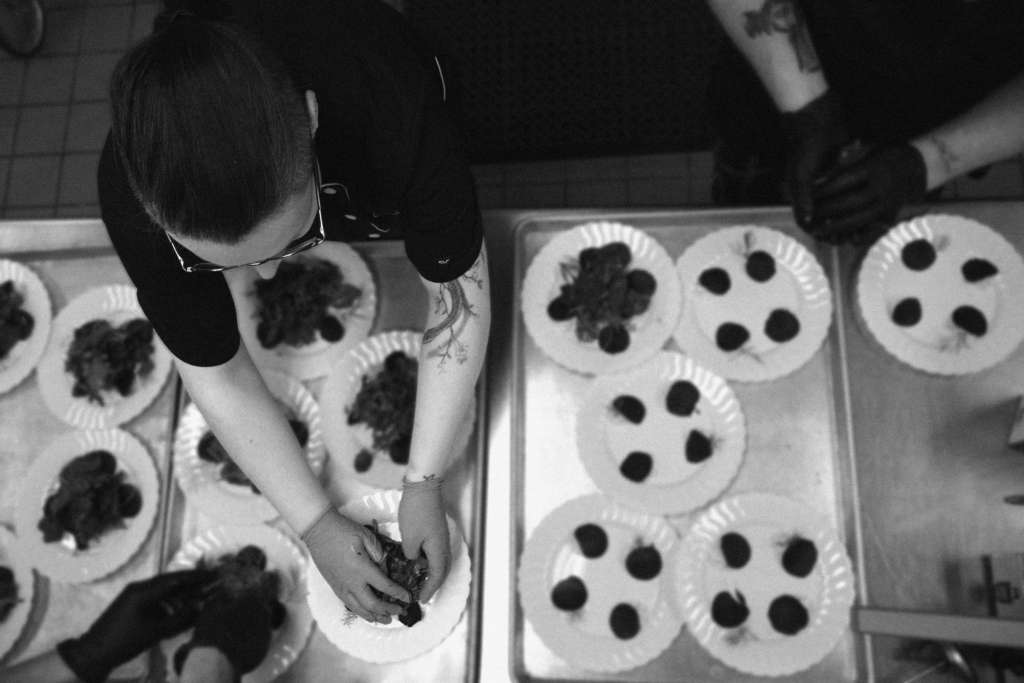
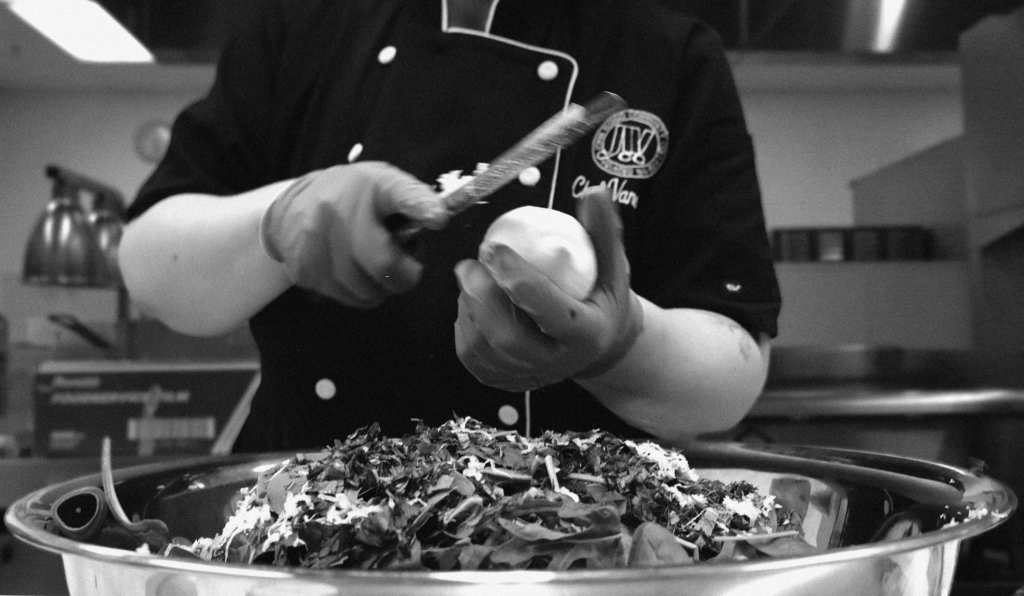
Aspen Gengenbacher
In the early hours of the following morning, I learned I loved beets — or at least was capable of loving beets when harmoniously paired with lemon dressed baby arugula and honey chive chèvre.
“I love converting people. Whenever someone says, ‘Oh, I don’t like this ingredient,’ you just haven’t had it made correctly or you haven’t had it in the right thing,” Hall explained less than 24 hours before the beet carpaccio conversion. “It’s about how you use the ingredients, not the ingredients themselves.”
As the whir of an air fryer sprang the chicken confit back to life, the aromas that swirled around the room had to have been similar to those that emanated from Julia Child’s “Rue de Loo” Parisian apartment as she perfected her duck confit recipe while studying at Le Cordon Bleu, the crème de la crème of culinary institutes.
The experience with that chicken — its skin golden and crispy, its meat tender and juicy, its flavors well-rounded, balanced and decadent — was one of spiritual nature, indeed.
“It’s about taking the same thing that people love and making it better,” Hall said. “I can actually eat this delicious food. It doesn’t have to come out of a bag for it to taste amazing.”
There have been no “girl dinners” since.
Cooking was ‘something that you can control when you can’t control anything else going on around you’
Hall’s culinary journey began in her childhood in Michigan.
“I wouldn’t let my mom make my lunches,” she shared. “I needed to do it.”
The lettuce had to be crispy, the turkey had to be thinly sliced and there had to be a little bit of mayo, but not too much. PB&Js had to have peanut butter on both pieces of bread with the jelly in between so the bread didn’t get soggy.
Her first restaurant job was as a server when she was 15. She wanted to go to culinary school straight out of high school, but ultimately chose a different path at the time.
“I’m from that generation where it was a, ‘But that’s not a real job, you know? That can be your back-up. What’s your career going to be?’ kind of thing,” she said.
She went to college instead, then to an office job with 60-hour workweeks that she was really good at but totally drained by. She cooked every night and she cooked and baked every weekend — mostly comfort foods, like chicken and dumplings — and the highlight of her weekdays, she said, was heating up the leftovers for lunch.
“Cooking was just kind of a natural progression for me,” she said. “It’s something that you can control when you can’t control anything else going on around you.”
After 11 years, Hall bit the bullet and finally went back to school when she was 30 at the International Culinary School at the Art Institute of Colorado, where she trained under a multicultural group of chefs whose instructions still play in her head and guide her in her own teachings.
Upon finishing the program, she became the head chef of a gluten free bakery, where she handled all of the baking and recipe development herself. It was there that a sense of curiosity for developing a healthier diet began to flourish.
“Then I got sick,” Hall said. “It was a very big chunk of my life. I had doctors telling me that I needed to go see a psychiatrist because there was nothing wrong with me.”
Hall endured several years of unexplainable health issues that perplexed doctors, first in Colorado then in Quincy after she moved here in 2019. During that time, she found relief in and repeatedly turned to the one medicine that was never prescribed to her: food.
“No shade on certain medications. My son has a seizure disorder, he needs medications. There’s a couple medications that I have to take every day to maintain, but I’m not on 15,” Hall said. “It should be a balance; whatever you can’t make happen with homeopathic (remedies)… That’s when medications should step in, because we have that ability.”
“But it shouldn’t just be a Band-Aid that you stick on everything.”
Once Hall began viewing food as a means of healing herself, her passion for it grew beyond something that she did for fun and for work — it became an entire philosophy.
Quincy gets Simply UnJunked
Hall was the head chef at the Taproom at Grown-n-Gathered, the restaurant adjacent to the wellness-oriented grocery store formerly located at 601 Maine that sold locally grown produce, niche and handcrafted goods, smoothies and grab-and-go items. Weeks before the pandemic started, she shifted to private chef services, which eventually led to meal deliveries, in-house cooking parties and catering gigs with Quincy Medical Group and for weddings and parties.
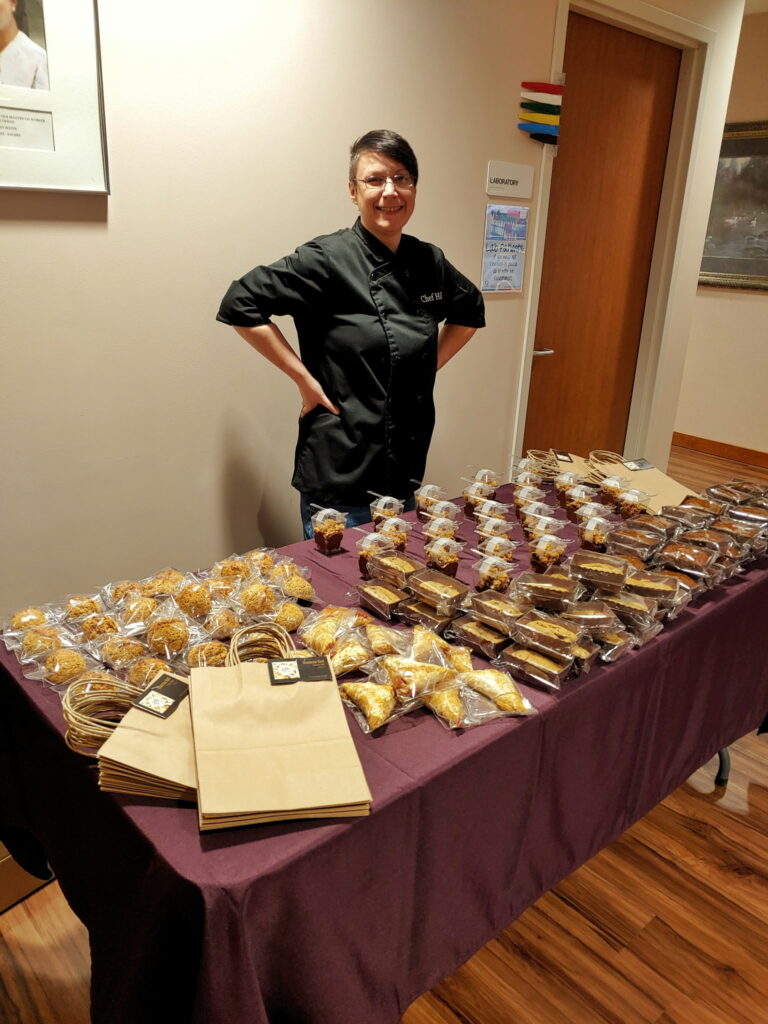
Photo courtesy of Vanessa Hall
And thus, Simply UnJunked was born. She credits her partner for coming up with the name.
“It just described it perfectly, because I couldn’t always get organic, I couldn’t always get non-GMO, I couldn’t always get local — but I definitely did all of that as much as I could,” Hall said. “It was a perfect kind of amalgamation of everything that I did.”
The good news of Hall’s gluten free goodies and other offerings spread quickly by word of mouth, and soon she became the go-to source for alternative diet-friendly foods — a market that was, for the most part, uncharted territory in the area at the time. Simply UnJunked went a step farther, though, by catering to alternative diets like gluten free, dairy free, lactose free and vegan and keeping the ingredients clean.
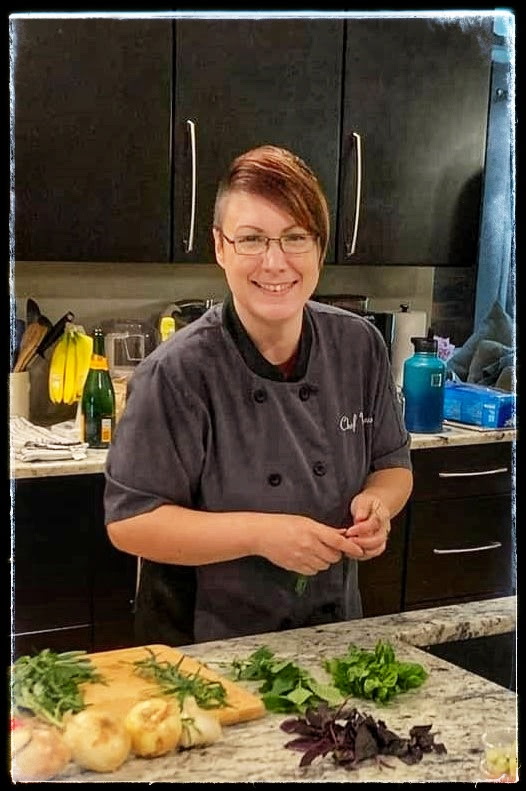
Photo courtesy of Vanessa Hall
“It’s really interesting, trying to do something like that without using vegan butter,” Hall said of making a wedding cake for a lactose-intolerant bride. “Vegan butter is extremely toxic because of the seed oils in it, or what we always called ‘margarine.’”
In an article published earlier this month by the Cleveland Clinic, registered dietician Julia Zumpano explained that while seeds are generally recommended to include in a healthy diet, seed oils are in a different category.
“Seed oils are made through a chemical process where they’re bleached, refined and heated in order to be usable. That process strips the seeds of their nutrients,” Zumpano said.
Zumpano described how the oils are primarily used in ultra-processed foods and can cause inflammation in the body which can manifest in the form of arthritis, heart disease and type 2 diabetes, among other things.
“Our brains, biologically, are trained to enjoy things that are good for us,” Hall said. “We crave things that our body needs, and what the food industry has done is they’ve taken and used… all these chemicals to trick our brains into thinking, ‘Oh, this is delicious, therefore this is something my body needs,’ but it doesn’t.”
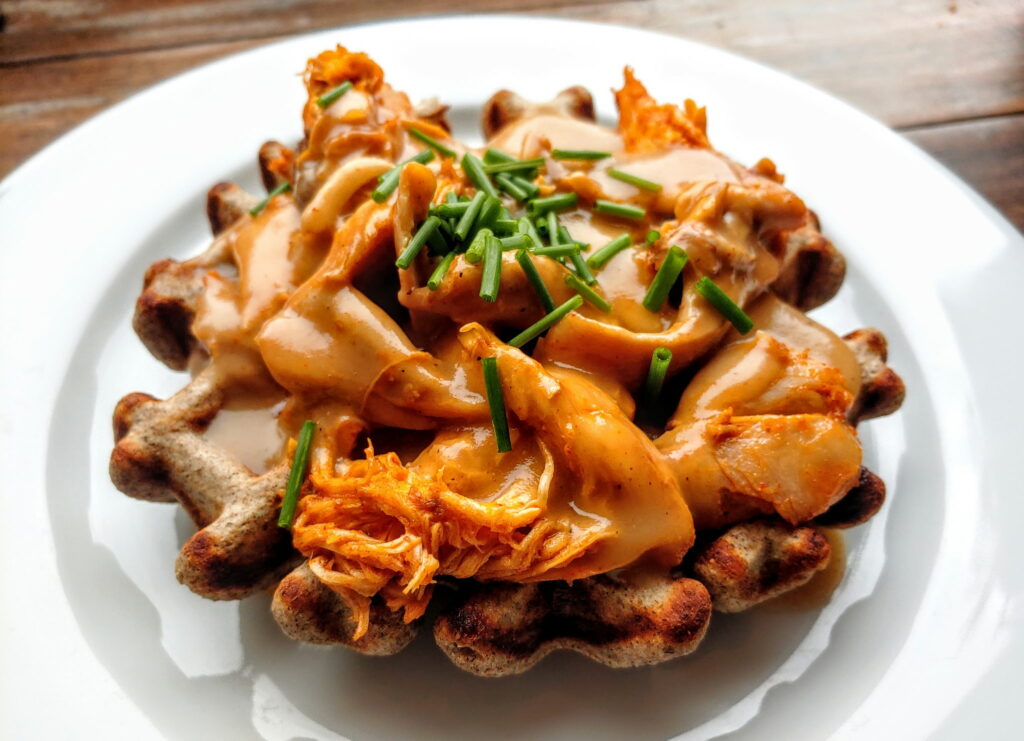

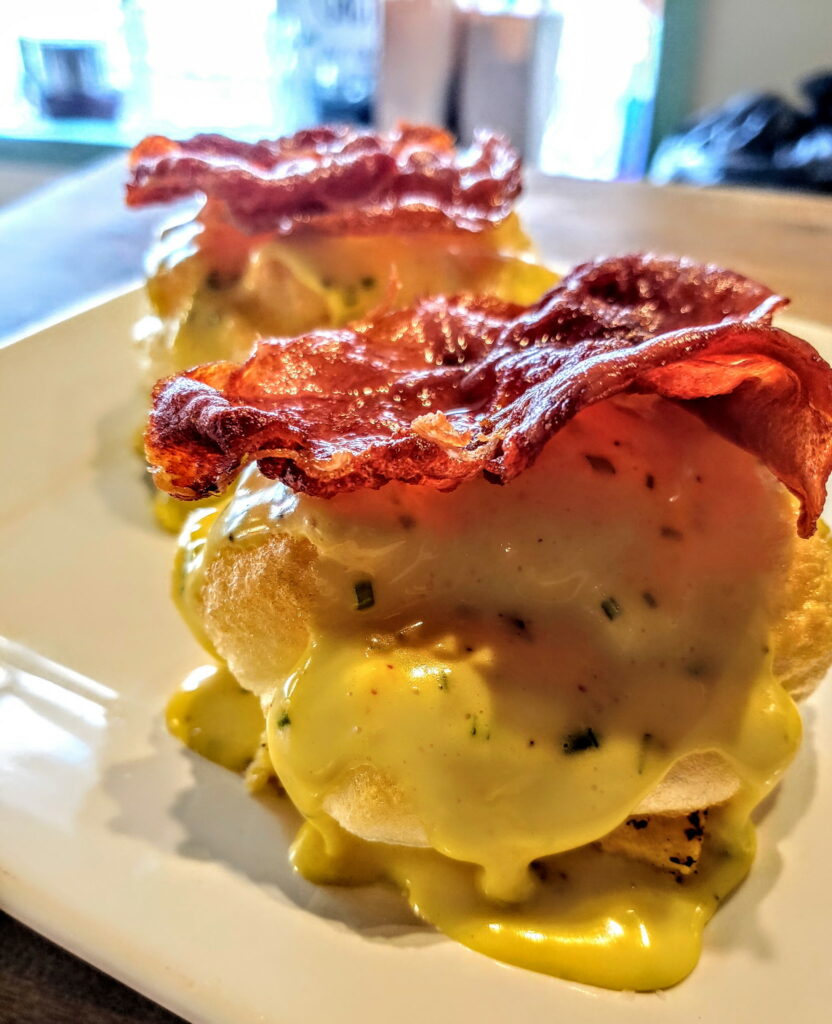
Photos courtesy of Vanessa Hall
She believes it’s essential to understand how to read and interpret ingredient labels. She said that a Dorito, for example, has been chemically enhanced to produce the same reaction in the brain that would occur upon tasting a caramelized onion with a little bit of honey, lemon juice, herbs, sea salt, pepper and a touch of heat by employing a delicate combination of the following ingredients (Cool Ranch):
- corn
- vegetable oil (corn, canola, and/or sunflower oil)
- salt
- corn starch
- tomato powder
- lactose
- whey
- skim milk
- onion powder
- sugar
- garlic powder
- monosodium glutamate
- maltodextrin (made from corn)
- cheddar cheese (milk, cheese cultures, salt, enzymes)
- dextrose
- malic acid
- corn syrup solids
- buttermilk
- natural and artificial flavors
- sodium acetate
- artificial color (red 40, blue 1, yellow 5)
- spice
- citric acid
- disodium inosinate
- and disodium guanylate.
The brain interprets the flavors as delicious either way. The body does not.
“You have to go through a lot more… Cooking the onions and squeezing the lemon and cutting up the herbs and throwing this in there and mixing it up, instead of opening a bag and popping it in your mouth. One is really good for you and really healthy, the other one just gives you flat satisfaction,” she said.
The familiar names and similarly designed packaging of the most recognizable ultra-processed foods have led many to believe that, if they grew up eating it and turned out fine, their kids will be fine eating it. But ingredients started to shift in the second half of the 20th century, when foods started to become chemically enhanced to reach the “bliss point,” thus sending chronic disease rates — and processed food companies’ profits — soaring.
“You look at the ingredients and they’re completely different. Yes, they used food dyes (in the past) — back then they didn’t know any better. We didn’t know any better. Now we do,” she said. “What these younger generations are growing up on is not what my generation grew up on. It’s not what my parents’ generation grew up on.”
Generation UnJunked
Though many of her culinary school classmates in Colorado often spoke of opening their own restaurants and bakeries, Hall was more interested in teaching. So when Barbara Holthaus, director of advancement at JWCC, approached her in late 2020 about teaching cooking classes as part of the school’s Community Based Outreach program, Hall enthusiastically accepted.
She’s offered classes in knife skills, mixology, French cuisine, South African cuisine, pasta, nutrition and others — all of which are open to the public so long as a prerequisite isn’t required.
Eventually she was hired to work alongside Hal Axelrod to resurrect the school’s Hospitality and Culinary Management program, which launched in fall 2024. Axelrod covers the hospitality side of the program, while Hall covers the culinary side.
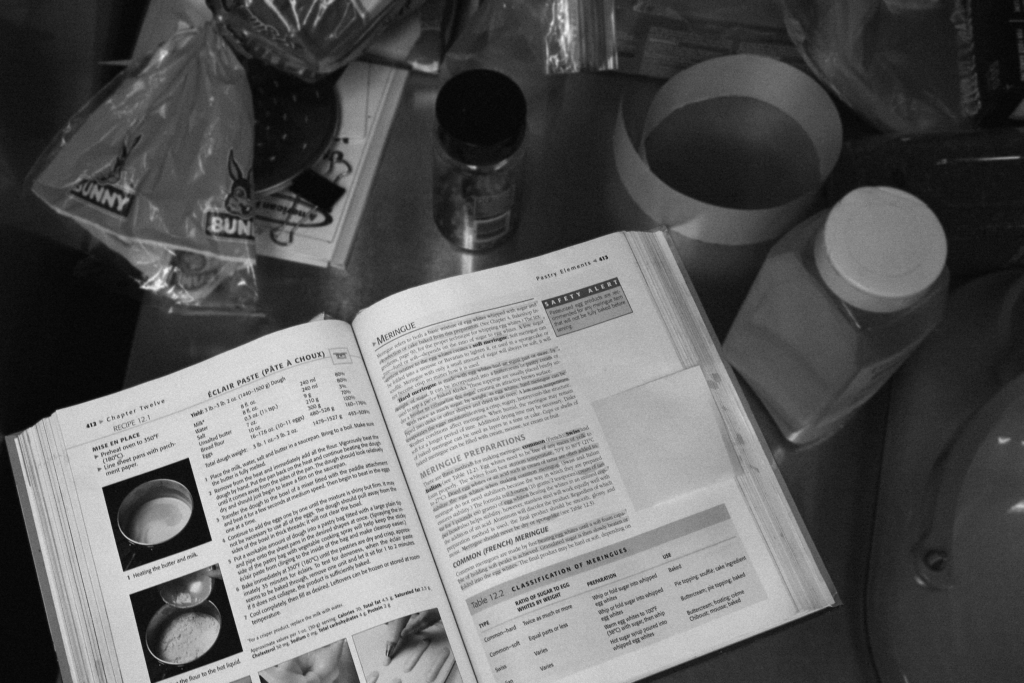

According to Hall, the JWCC kitchen is 99% seed oil free, opting instead to cook with tallow or butter they render themselves. They use Italian flour — “the same stuff you would get in a French or Italian bakery,” Hall said — instead of enriched wheat flour.
Students are taught to break down locally-sourced whole and half animals themselves. Much of their produce comes from Terripin Farms or from the program’s own pesticide-free greenhouse, which is where the arugula I scarfed down came from.
Hall is fostering a new generation of chefs — ones who are learning to cook cleanly and to work compassionately.
It’s a sharp departure from the days of old, when commercial kitchens were notorious breeding grounds for unbridled drug use, undeniably normalized and arguably encouraged alcoholism and communication styles that were brutally efficient at their kindest and verbally abusive at their most sincere. (See: Kitchen Confidential. Bourdain, 2000.)
“If you’re gonna yell, you can get out of my kitchen,” Hall said. “I don’t like having that energy around me, and I think it affects the food.”
Toby Chambers is a part of that new generation.
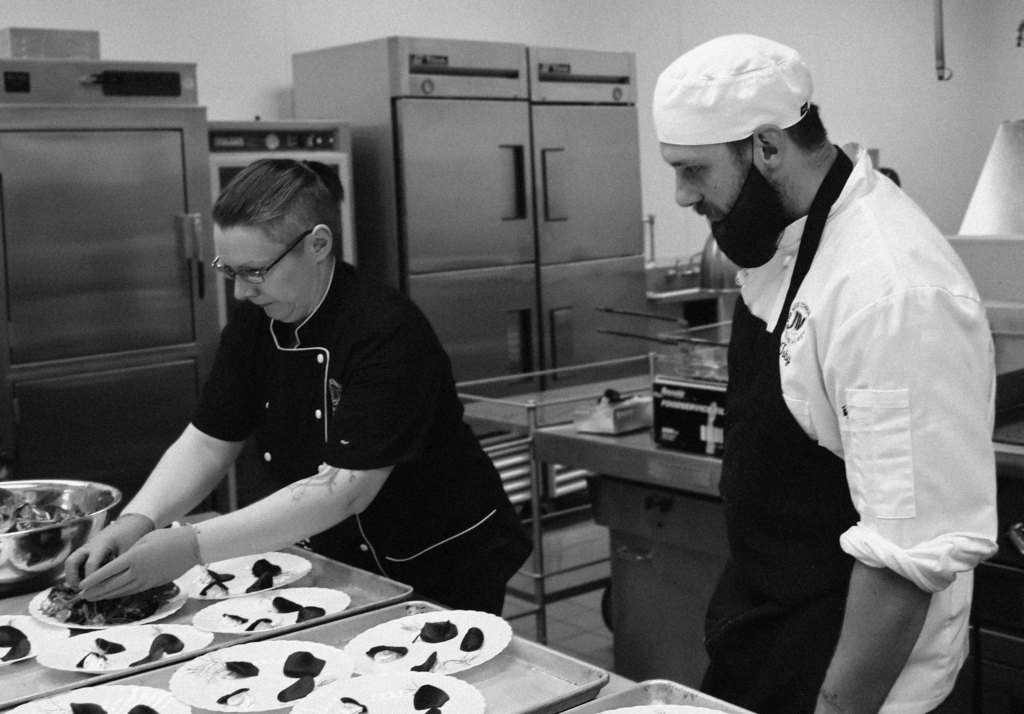
Aspen Gengenbacher
“There’s corn oil in almost everything I was eating last semester,” he said. “Since starting last semester, my food choices of what I’m buying are a lot better. I’m buying a lot more whole products, I’m cutting them down. Not only to save money, but it’s also the freshness.”
Three weeks after signing up for culinary school at age 20, Chambers was shot in the leg and had to use a wheelchair for a year. He went on to work in “at least 12 different restaurants” in the years that followed, and while he could cook any recipe anyone put in front of him, he didn’t have the comprehensive knowledge and skills, the creativity or the confidence to keep moving forward.
He wanted to be somewhere he could learn and continue fostering his culinary talents and curiosities.
Chambers described gaining a sense of control, a resurgence of motivation and a flair of creativity since beginning his training under Hall.
“This is why I’m here — to learn not just how to be a good cook, but to be a chef,” he said.
He hopes to work under another talented chef when he finishes the program and maybe try his hand at private catering before eventually opening his own restaurant farther down the line.
“Toby would be an asset to any kitchen,” Hall said. “They’d be lucky to have him.”
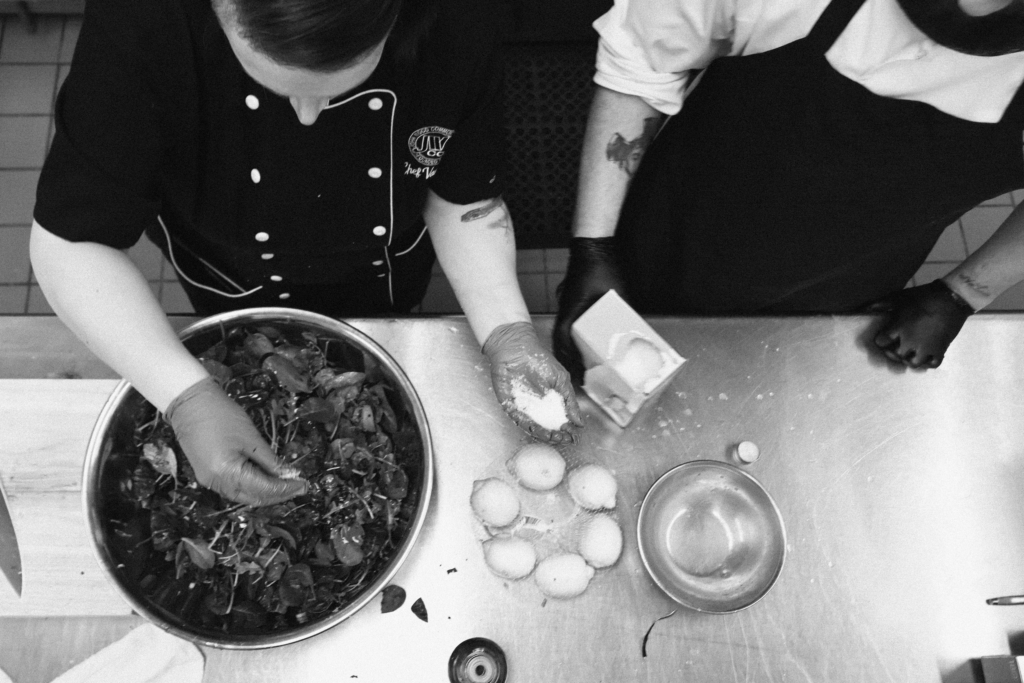
Future head chefs and restaurateurs are primed to pass along the Simply UnJunked philosophy they learned from Hall in the classroom to diners across the region. The potential outcomes are limitless but are sure to be flavorfully diverse, locally sourced, holistically minded and really, really, really delicious, with the power to transform eaters into epicureans in the process.
“My goal — 100 percent — is to change the food landscape in this area, to show people what it can be. You’re always going to have the same people that want their meat and potatoes, and that’s all they want. But (with) better quality meat, better quality potatoes — anybody can improve the way that they eat,” Hall said. “They don’t have to change the way they eat to improve what they eat.”
While expanding upon and enhancing the things we already know and love is admirable in and of itself, there’s a greater mission at the heart of it that extends beyond the boundaries of one’s plate.
“We’re not just changing the food landscape,” Hall said. “We’re changing lives.”
Keep an eye out for JWCC’s next dinner-and-a-movie event, which is scheduled for Apr. 24 and open to the public with free admission. The movie is to be determined, but the good eats are all but guaranteed.
Miss Clipping Out Stories to Save for Later?
Click the Purchase Story button below to order a print of this story. We will print it for you on matte photo paper to keep forever.

